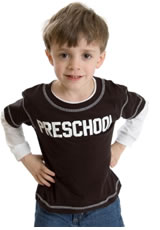
 UK's Tough New Academic Standards for Preschoolers
UK's Tough New Academic Standards for PreschoolersExperts and government at loggerheads
Early childhood education is a hot topic in the UK media right now due to an academically rigorous curriculum being implemented by the Government.
The Early Years Foundation Stage (EYFS) is a comprehensive statutory framework that sets the standards for the learning, development and care of children from birth to five for nurseries, preschools and child minders.
The EYFS was introduced in 2008, and was recently overhauled following a review published in 2011, which found that the academic requirements of the framework weren't enhancing children's early development.
The overhauled version of the framework is due to be implemented in September this year and while it cuts the number of academic targets under-fives are supposed to meet from 69 to 17 it has met with widespread criticism for being too academic.
For example, the framework requires all preschool aged children to:
- Read and understand simple sentences in books and use phonic knowledge to decode regular and some irregular words
- Write simple sentences that can be read by themselves and others
- Count up to 20 and use simple addition and subtraction to solve practical problems
- Use everyday language to describe and compare size, weight, capacity, time and distance.
A group of leading academics and child care industry groups are spearheading a campaign against the Government's EYFS. The new group, called Early Childhood Action (ECA), are developing an alternative curriculum, called the Alternative Foundation Phase(AFP) which they say will build on the EYFS's positive aspects, while addressing its key shortcomings.
Specifically, the AFP will highlight:
- the central place of young children's physical development and of imaginative, spontaneous play across the curriculum
- the 'schoolification' of early childhood with its over-assessment and excessive monitoring, with normalised 'measurement' impeding in particular the progress of boys, summer-born children, and those with English as an additional language and special educational needs
- the controversial 'Early Learning Goals', with their premature emphasis on cognitive learning, and the associated adoption of developmentally inappropriate pedagogical practices
- the undue pressures on parents to prepare children for formal schooling according to a system that is too inflexible to cater for the highly diverse developmental needs of young children
- disquiet about commercial influences, and the statutory imposition of inappropriate ICT experiences on to young children
- ways of pursuing equality without imposing a non-discriminating compulsory framework that impacts upon all children, irrespective of their needs.
"Parents are under undue pressure to prepare children for formal schooling, according to a system too inflexible to cater for the highly diverse developmental needs of young children," the letter says.
"Many feel disquiet about commercial influences and the statutory imposition of inappropriate computer experience on young children.
"There should be ways to pursue equality without imposing an indiscriminate compulsory framework upon all children, irrespective of their needs."
Speaking to The Daily Telegraph a spokesman for the UK Department for Education says:
"Of course play and imagination are a crucial part of childhood, but we also have to make sure children are ready to learn when they start school.
"Our emphasis on school-readiness does not mean formal education at two years old. It means building on children's natural curiosity and desire to explore and play by making play a central part of children's learning.
"Our reforms will ensure that families are supported to give children the very best possible start in life and every opportunity to fulfil their potential."
What are your views on our own Early Years Learning Framework (EYLF)? Share your views here
© 2012 - All rights reserved
Care For Kids Internet Services Pty Ltd
ABN 55 104 145 735
PO Box 543 Balmain NSW 2041
privacy policy contact us